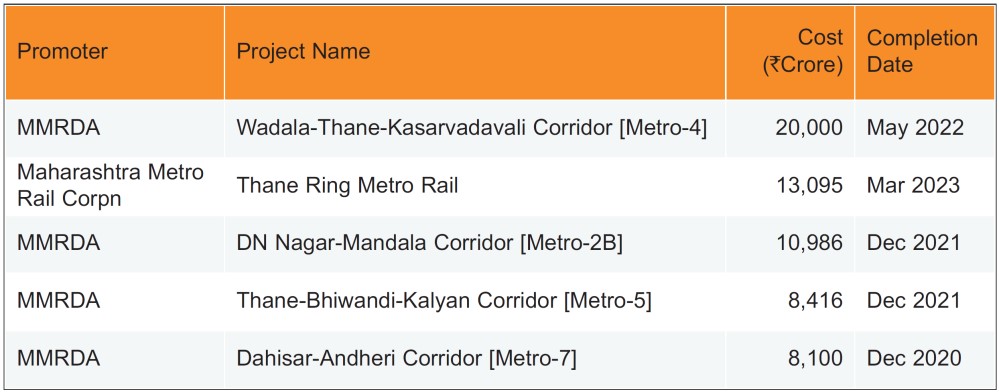The conundrum of easing transportation in Mumbai

Mumbai got its first Metro corridor in June 2014 which runs from the western suburb of Versova to Ghatkopar in the east. It is built on public-private partnership model, whereas the ones under construction are being taken up on engineering procurement contract (EPC) basis.
In a move to pave the way to ease commuters’ travelling burden on the existing suburban railway network, the Maharashtra Cabinet has fast-tracked Metro projects across the city. The Mumbai Metropolitan Region Development Authority (MMRDA) and the Mumbai Metro Rail Corporation (MMRC) are nodal agencies undertaking different Metro projects covering the metropolis.
In the latest update, the State Cabinet gave approval to three Metro projects which will come up in the Mumbai Metropolitan Region (MMR). The proposed routes are Metro-10 (Gaimukh in Thane to Shivaji Chowk, Mira Road), Metro-11 (Wadala to GPO, Chhatrapati Shivaji Maharaj Terminus), and Metro-12 (Kalyan to Taloja) at a cumulative cost of Rs 19,000 crore.
Metro-10 corridor will span over 9.2 km and will be built at an expense of Rs 4,476 crore. It will connect the CSMT-Wadala-Thane-Kasarvadvali route. The project is expected to be ready by 2022.
Metro-11 corridor will span over 12.7 km and cost around Rs 8,739 crore. It will have a four km elevated corridor between Wadala and Sewri, while the 8.7 km Sewri-CSMT patch will be underground. The project is likely to be completed by March 2026. The Cabinet also approved seeking financial help from the World Bank, New Development Bank, JICA, and other international funding agencies for the project.
Metro-12 corridor will cost Rs 8,739 crore and span over 20.7 km. The government of Maharashtra has set March 2024 as the deadline to complete the project, which will benefit commuters from Kalyan, Navi Mumbai, Taloja, and the upcoming Navi Mumbai International Airport area.
Apart from this, the government has also proposed to integrate this project with Metro-5 which covers Thane-Bhiwandi-Kalyan and Navi Mumbai Metro line. MMRDA, the nodal agency undertaking the three Metro projects, had prepared detailed project reports (DPRs) of these new Metro lines. The State Cabinet on 23 July 2019 accepted the DPRs and gave green signal to proceed with the work.
An internal metro line has also been envisaged to be taken up in Thane city. The proposed 29 km internal Metro will have 22 stations and is estimated to cost around Rs 10,893 crore. The project will be implemented by the Maha Metro on behalf of the Thane Municipal Corporation (TMC).
Out of the total 29 km long route, around 26 km will be elevated and the remaining three km stretch will be underground, considering traffic congestion near Thane railway station. The project was granted the State Cabinet approval in March 2019.
Another big-ticket project taken up by MMRC, the Colaba-Bandra-Seepz Metro Rail Corridor [Metro-3] in two phases, has a completion slated for December 2022. The fully underground Metro corridor is being developed at an investment of Rs 30,000 crore and will be implemented in 18 packages. Phase-I from Seepz to the Bandra-Kurla Complex is expected to be operational from 2021.
As per the latest update available with Projects Today, 14th TMB breakthrough has been achieved at MIDC Metro station and tunnelling work in length of five km between Pali ground to MIDC station has been completed. The project has achieved major milestone as 50 percent of the total tunnelling work is over in a span of 19 months. The remaining 28 km tunnelling is expected to be completed before June 2020.
Apart from strengthening and transforming the rail routes across Mumbai, a mega road project has also been envisaged connecting Kandivli to Nariman Point (Coastal Road Project). The project is an eight-lane freeway of which six-lane is dedicated to vehicular traffic and the remaining two lanes for bus rapid transport system (BRTS). Apart from this, recreational facilities include cycling track, jogging track, botanical butterfly garden on atleast 160 ha of reclaimed land with substations, among others.
The coastal road project has been facing hurdles as a recent Bombay High Court ruling has cancelled the coastal regulation zone (CRZ) clearances granted to the project, thus bringing work on the project to a halt. The Bombay High Court has asked the authorities to obtain environment clearances and notifications after a proper Environmental Impact Assessment (EIA) notification issued by the Centre. Work on the long-pending project had started in October 2018, but the bench quashed and set aside the approval granted by the Maharashtra Coastal Zone Management Authority (MCZMA) on 4 January 2017, the nod given by the Expert Appraisal Committee (EAC) on 17 March 2017 and the final approval granted by MoEF&CC on 11 May 2017.
Other Upcoming Metro Projects
